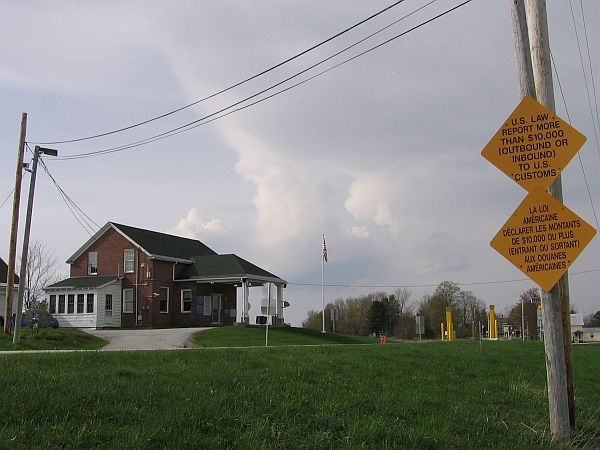 (Host) Residents of far northern Franklin County want the federal government to change its mind about shutting down a tiny border crossing with Canada.
(Host) Residents of far northern Franklin County want the federal government to change its mind about shutting down a tiny border crossing with Canada.
They say their community spans two countries, and that economic and cultural ties would be strained if the station were shut down.
As VPR’s John Dillon reports, this is the latest controversy involving the Morses Line International Port of Entry.
(Dillon) The Morses Line working group gathered recently at the Highgate town offices. Sitting around the table were farmers, town officials, a truck driver and a nurse who lives just over the line in Canada but commutes to St. Albans.
A lanky man wearing a black cowboy hat summed up their mission as he introduced himself to the crowd.
(Danderand) "Yvon Danderand, Franklin Select Board. We got to save this port. That’s what the whole battle is about. For family purposes, culture, economics, you name it."
(Dillon) The group began organizing after the Department of Homeland Security decided to shut down the Morses Line border crossing. The tiny 1930s-era brick customs office – located between Highgate and West Berkshire – had become a big public relations pain for Washington.
That’s because Homeland Security first came up with a $15 million plan to replace it. The expansion plan required the government to use a neighboring farmer’s land for the project. When the farmer resisted, the government threatened to seize up to five acres by eminent domain.
Here’s Brian Rainville, the farmer’s son, in April of last year, describing the government’s original plans.
(Rainville) "So we’re looking at putting in a stormwater pond, a traffic turnaround, covered parking, three designated traffic lanes, two stages of radiation detectors, a two-story building with a fitness center on the second floor. And room for a helicopter to land out front if need be. It all strikes me as a little much for Morses Line."
(Dillon) Neighbors and even members of the Tea Party rallied around the Rainvilles. They questioned the need for an expensive, high tech facility that doesn’t see much traffic in northern Vermont. But what they didn’t expect was that the government would abandon the border port completely. Yvon Danderand said the move caught everyone by surprise.
(Danderand) "They didn’t hear from the local people. They didn’t even ask the local elected officials. Franklin Select Board? How about our Franklin-Highgate representative that represents us? There was no communication with them. They didn’t know when they made the decision to close Morses Line. No one knew."
(Dillon) Danderand’s ties to Canada are rooted in family. His ancestors moved to the U.S. from Quebec, and he’s the fourth generation on his farm.
(Danderand) "But as the years went by all of them – including myself, so four generations – married a Canadian. So we got family right around the Morses Line border that we go see, very frequently. Well, I’m always crossing the border, for family purposes."
(Dillon) If Morses Line was closed, Danderand says, he would have to drive west to Highgate or east to the Berkshire crossing. Either way, it would add at least 45 minutes to what is now a 15 minute trip.
Chad Bouchard is another member of the Morses Line group. He’s a former Marine who hopes some day to take over his family’s farm near the border. He sells produce from the farm now. And he says he’s beginning to attract Canadian customers by using French signs and agreeing to take their money at par.
(Bouchard) "It was really tough to get Canadian business there the first few years. But now I do those little things to let people know I’m trying. It’s working. It’s starting to pay off. And you know, it’s not getting me rich. And if it closes it’s not going to tank me completely from what I’m doing right now. But I mean it takes away any room for growth."
(Dillon) But the Department of Homeland Security has ruled that the border closing will have negligible impact on the local community. And it says in a legal notice that the government would save at least $5 million dollars by not building a new facility.
Local organizers are now trying to rebut the government arguments. At the Highgate meeting, they got some advice from Ted Brady, an aide to Senator Patrick Leahy.
Vermont’s senior senator now wants the port to stay open. But Brady told the group by speaker phone that they have to marshal strong evidence because they’re engaged in a legal process.
(Brady) "The decision will be made as if you’re in a trial. The only evidence that can be considered in a trial is the evidence that’s submitted during that trial. This notice of the proposed closure is that trial."
(Dillon) The working group has come up with several options they say will work to keep the port open, at far less cost than the original design.
Tim Smith is executive director of the Franklin County Industrial Development Corporation.
(Smith) "All of them are smaller than the original proposal back four years, back two years ago. All of them are cost-efficient. So there are alternatives they can look at, other than taking land by eminent domain."
(Dillon) Smith says another landowner has agreed to sell his property so the Rainvilles won’t have to sacrifice part of their hay field.
Meanwhile, the Rainvilles – the farm family at the center of the original controversy – are staying silent on the issue. They say the facts the government used to justify the closure speak for themselves.
For VPR News, I’m John Dillon.
EXTRA: Read Senator Leahy’s letter to the Commissioner of the U.S. Customs and Border Protection